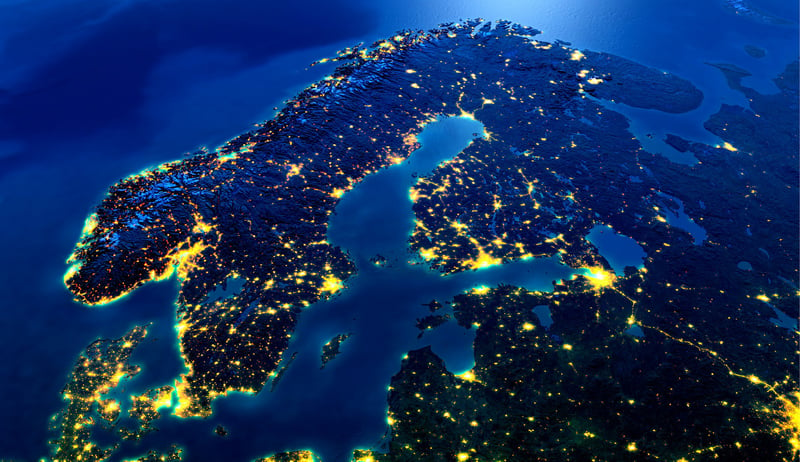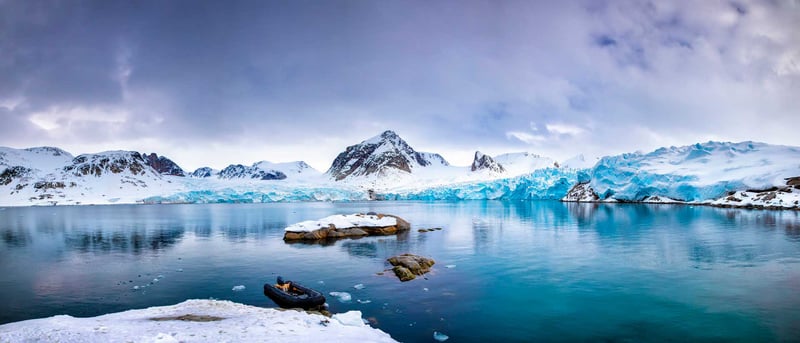The world is changing, and the Arctic north is becoming more accessible and opening up new business potential. But first, investment in digital and physical infrastructure is needed.
Climatic changes in the Arctic region are affecting the business ecosystems of not only Europe and Asia, but also North America. The area has enormous business potential, but its realization requires major investments and viable communications links.
C-Lion1 submarine cable connection, built and operated by Cinia, has already considerably improved the possibilities of Finnish and European companies to reach new markets and offer their services to a wider target group. Added to this, the Arctic Connect initiative opens many international cooperation opportunities.
Utilization of the Arctic requires viable communication links
As the Arctic ice melts away, a huge new geopolitical area is being formed on the Earth. Whilst there is a general concern about climate change, there is a growing interest in the business opportunities of the Arctic; according to estimates by Guggenheim Partners, around 900 projects are planned in Arctic areas, worth in total approximately a trillion dollars.
The Arctic region offers magnificent business opportunities for building infrastructure, for roads, as well as for the mining and energy industry. The fossil energy resources, oil and gas, as well as renewable energies, enable the creation of different kinds of business operations and models. Therefore, the investments in the area are also significant.
Despite the enormous potential, the realization of the investments also requires a huge number of functioning infrastructures, like roads and energy solutions that all should respect the fragile natural ecosystem. Only a well-functioning infrastructure makes living and working in the area possible.
Arctic investments require secure high-speed Internet access. Currently, the area relies on an Internet access provided by a satellite, which is neither very cost-effective nor fast.
Obviously, the necessary infrastructure also includes communications links. Since the size of the area is very large, investments require secure high-speed Internet access. Today, there aren’t many industries on the market for which network access isn’t a necessity, and the businesses operating in the Arctic will also definitely need it. Currently, the area relies on an Internet access provided by a satellite, which is neither very cost-effective nor a fast way to transmit information.
Reliable Internet connection makes distances disappear
In the Scandinavian countries, which are located near the Arctic regions, we can observe a clear polarization development which means that the towns and cities of the northern region are emptying while people are packing into the growth centers of the south. The municipalities of the area have woken up to the situation, and according to our study, strategies of every single one of them take a stand on reversing this trend.
In remote areas, a reliable communication network can better the chances of employment, and successful examples already exist. With the help of a fast and reliable Internet connection, a person living in Northern Finland can complete 3D modelling related tasks or analyze X-ray photographs taken in the capital Helsinki or anywhere in the world.
Reliable remote connections are a precondition for versatile employment, but they also provide other services in remote areas. Healthcare and medical services like doctors´ appointments can today be carried out online. There is also a demand for training and consultancy services, regardless of the location.
Ideally, remote work is a self-perpetuating positive circle; the more common remote work becomes, the more companies can provide and also buy remote services themselves. The common factor to all remote work is that the dependence on services provided by larger urban conglomerations reduces.
Arctic Connect project enables future investments
At Cinia, we have wanted to emphasize the significance of the Arctic for quite some time. Therefore, the Arctic Connect initiative, actively promoted by us, has already focused for three years on building a digital bridge between Europe and Asia. The objective of the international communication link is to enable new businesses backed by digitalization, and create new job opportunities.
The initiative is also seen as important on the political level, and its implementation has been on the agenda of the Arctic Council as well. The Arctic Connect has gained support from Germany, Finland, Sweden, Norway, Russia, Japan, and China. The Ministries of Transport and Communications of these countries have met for negotiations at the official level. Cinia Oy acts as the primary motor for the initiative, by driving things forward and also involving commercial entities.
Business clusters of the future are found in the Nordic countries
Environmental factors – global warming, which is shaking the whole world, and the changes that it will bring – will alter the world significantly both geopolitically and economically. The field of operation of a very large number of businesses will expand to Arctic latitudes. As a result, the important business clusters will also be able to move towards the North.
Consequently, future change will also affect the role of Finland, the other Nordic countries, and other areas of Northern Europe in the global market. The importance of the area will increase, and preconditions for the new, emerging business concentration situated in Scandinavia will improve.
We have taken this into account in our work, and in the future we will provide a more direct, more reliable, and faster route from Central Europe via Finland to the northern parts of Russia, Japan, and the growing market of China.
C-Lion1 submarine cable connects Germany and Finland
In 2015, Cinia started building a fast and cyber-secure submarine cable connection. The cable was completed in early 2016, and it connects Rostock in Northern Germany to Hanko in Southern Finland. The system of eight fiber pairs provides a capacity of 144 Tb/s, which alone would cover the current network traffic needs of the whole Northern Europe.
C-Lion1 provides a unique route from Central Europe to the North. It enables a secure data exchange for fast-growing capability requirements and improves the business and growth opportunities of companies.
Hetzner Online’s data center already makes use of the favorable location of Finland and the low energy costs.
For some time, Finland has been a very attractive country for big international data center operators. For example, the data center of Google located in Hamina in South-East Finland is one of the company’s most advanced and most effective data centers.
The unique northern location between east and west, and a stable and neutral political standing, makes Finland an attractive territory for data centers. The cool climate is also an argument in favor of investment decisions.
Hetzner Online GmbH, a German data center operator and provider of web hosting services, and a significant client of Cinia, has already taken a step towards the opportunities offered by the Arctic.
In 2015, an agreement was concluded, under which Hetzner Online GmbH utilizes the submarine cable C-Lion1 built by Cinia, and both parties contribute to building a digital infrastructure between Germany and Finland. The agreement allowed Hetzner to get fast and reliable connections from its network and data centers in Germany to Finland and other Nordic countries, as well as to Russia.
Hetzner Online GmbH chose the town of Tuusula in Southern Finland as the location for its new data center. One of the most important criteria for selecting Finland was that the cost of energy is significantly lower in Finland than in Germany. This has a direct effect on competitiveness; an electricity-consuming data center can compete on international markets when costs remain moderate.
In addition, the decision was strongly influenced by Finland’s central location near Russia and between Eastern and Western Europe. The fact that Finland’s cool climate is particularly good for data center operations was also of importance.
A fiber optic network required by the data center existed already in the Tuusula area. The town was also able to offer a 150,000 square meter site. The site is located near the town center, which facilitates access to the workforce.



